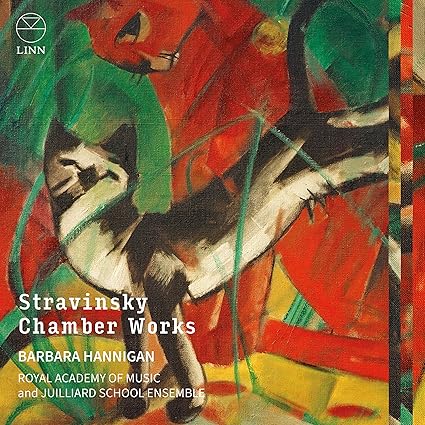

Igor Stravinsky (1882-1971): Concerto in E flat 'Dumbarton Oaks' Igor Stravinsky (1882-1971): Three Japanese Lyrics Igor Stravinsky (1882-1971): Two Poems of Balmont Igor Stravinsky (1882-1971): Septet Igor Stravinsky (1882-1971): Three Little Songs (Recollections of my childhood) Igor Stravinsky (1882-1971): Octet Igor Stravinsky (1882-1971): Concertino for twelve instruments - Charlotte Corderoy (Conductor) Igor Stravinsky (1882-1971): Ragtime for eleven instruments
One of the great delights I have had over the years of listening to music is hearing performances by young musicians. Some of those have been the most life-enhancing I have ever listened to, the deep joy in music-making communicated without the gauze of age, ambivalence, and compromise. The orchestra and soprano Alexandra Heath produce some very lovely sounds in a recital rooted in some neo-classical classics, with varied songs and lesser-known chamber pieces that reflect a range of the chameleon-like composer's many styles followed through his career.
Add to this Barbara Hannigan as conductor (yes, not singer on any of these pieces), herself a captivating and highly creative performer, combined with an unusual program, incorporating some well-known pieces and several less familiar. I have always felt that listening to anything by the great composers, Stravinsky counts as one of the greats in my estimation, is worthwhile. And it is here.
Linn Records have produced many recordings with a very high technical standard, and so it is here, with the chamber orchestra textures coming through clearly, clearly a joint Royal Academy and Juilliard ensemble of accomplished soloists.
The two familiar anchors in this recital are the Dumbarton Oaks concerto and the Octet. Dumbarton Oaks kicks off the concert, and Hannigan sets a leisurely pace, slower than I am used to, but has the advantage of enabling the wonderful individual lines and details to be heard very clearly. I became convinced of the value of this approach after several listening sessions, even if I still prefer a slightly brisker tempo. I did not get the same sense of slower speeds in the Octet, a similar piece to the concerto in that it has that Stravinskian combination of 18th century elegance with the composer's customary astringency. They are both very enjoyable, the humor integral to the pieces and the neat sophistication of the writing emerging clearly, along with the emotional restraint in keeping with the neoclassical approach. I kept thinking of the composer's 'Pulcinella' suite, with a similar balance of humor and grace.
The Three Japanese Lyrics were premiered in 1914, and they clearly bear the influence of Schoenberg's Pierrot Lunaire (premiered in 1912) but without the same expressionist decadence. The forces involved, soprano with chamber ensemble, along with the songs' brevity, underline that influence, resembling the broad and yet delicate brushstrokes of a traditional Japanese painting. The three songs cover varying tempi, following a slow-fast-slow pattern, and bring forth some agile and sweet sounding singing from soprano Alexandra Heath, and delicate playing from the instrumentalists.
The Balmont settings, composed a few years before the Japanese lyrics give forth a different feel, much more Russian and, as the booklet points out, sounding much more like Rimsky-Korsakov than Schoenberg, but still with the extreme brevity. Again, beautifully sung and played.
I had not heard the Septet prior to this review. It was written a lot later than the other works on the disc, and is an intriguing combination of the neoclassical and the serial periods of the composer's life. It has that keyless feel of a mature Schoenberg work, and yet dances with the sophistication of an 18th century form. It is purely instrumental, so clarity in playing and recording is a high priority, and it is provided here.
The Three Little Songs are a return to the Russian influenced representational style of his earlier style, based on Russian folk songs. They are short (again) but very entertaining and provide a good contrast for the soprano to have to manage.
The remainder of the disc is instrumental. The Concertino and Ragtime were both written in the years immediately following the end of the First World War (Stravinsky claimed Ragtime was written on the date of the Armistice). The Concertino was originally scored for a string quartet, but here is presented in its 12-instrument version, including strings. They are both short and represent the turning away from the puffery of much art in the previous century. In the excellent quote from Richard Taruskin included in the booklet, they demonstrate "the new irony as well, teasing the inflated solemnity and the gaseous piety with which high art had been surrounded, and music most of all, in the pre-war decades."
In summary, an entertaining and informative listen, well played and recorded. If the composer and program interest you, then I would not hesitate.
Ian Orbell - October 2024 Dumbarton Oaks - Final Movement